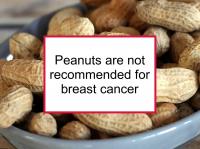Peanuts (Arachis hypogaea) are a significant source of both cancer-promoting and chemoprotective substances, including cadmium, copper, CoQ10, folate, manganese, melatonin, niacin (B3), peanut agglutinin, resveratrol, vitamin E, and zinc. Consumption of peanuts is associated with lower levels of systemic inflammation.
This anti-inflammatory effect may partially account for the inverse relationship between nut consumption and risk of cardiovascular disease and type 2 diabetes. Peanuts have also been shown to promote weight management because of their satiating effect.
Breast cancer-related effects of eating peanuts
Peanuts and peanut butter are good sources of campesterol, folate, melatonin, and resveratrol, all of which protect against breast cancer and its recurrence. However, peanuts are also a significant source of the potentially harmful copper and peanut agglutinin, as well as being a possible source of exposure to aflatoxin. Overall, it appears preferable to obtain the potential health benefits of peanuts by consuming other foods. The Not recommended rating assigned to peanuts (and peanut butter) means that they should be consumed infrequently.
Melatonin, resveratrol & folate
As noted above, peanuts are a good source of melatonin, resveratrol and folate, all of which have been shown to have chemopreventive activities with respect to breast cancer. However, note that the following foods incorporate even higher levels of these compounds and have clear anti-breast cancer properties:
- Melotonin: cherries (especially sour or tart), walnuts, and mustard, as well as red, black or purple rice.
- Resveratrol: blueberries and bilberries, cranberries and lingonberries, red currants, and mulberries.
- Folate: artichokes, broccoli, dry beans, greens (collard, mustard, turnip), parsley, romaine lettuce and walnuts.
Peanut agglutinin (PNA)
Peanuts contain peanut agglutinin (PNA), a protein that binds to a sugar that is expressed by most human cancers. PNA has been reported to have anti-cancer properties. However, PNA has also been demonstrated to promote breast cancer metastasis in cell and animal studies.
One study demonstrated that PNA at blood concentrations found after peanut consumption promotes the progression of two important steps in metastasis. Another study found that peanut consumption increased metastasis in a mouse model of breast cancer. Still another study reported that PNA had the potential to promote breast cancer metastasis through increased vascular invasion and lymph node involvement. A 2021 study demonstrated that circulating PNA increased tumor cell adhesion and tubule formation.
Copper
Peanuts contain approximately 0.2 to 0.4 mg copper per ounce (and about half that for an ounce of peanut butter), which can promote angiogenesis (new blood vessel formation). While copper is a vital nutrient, women with breast cancer who are not anemic probably should not exceed the RDA (recommended daily allowance) of approximately 0.9 mg. Refined peanut oil incorporates almost no copper.
Peanut molds and aflatoxins
Peanuts typically are infected to some extent with molds which produce aflatoxins, which are mutagenic, carcinogenic and teratogenic and cause immuno-suppression in humans. Aflatoxin B1 has been shown to cause liver cancer, especially in hepatitis B-positive individuals. However, peanut consumption is closely linked to liver cancer primarily in parts of Africa and China. U.S. regulations and precautions with respect to peanut molds are fairly strong; the risk appears to be limited to chronic low-grade exposure from frequent peanut or peanut butter consumption. Nevertheless, breast cancer patients have been shown to be at higher risk for other cancers and should avoid known carcinogens.
Peanut oil and breast cancer
Peanut oil is a source of vitamin E, some resveratrol and the omega-6 fatty acid linoleic acid (15% to 43% of total fat). Peanut oil contains only a trace amount of copper and PNA. In addition, peanut oil typically contains only a small fraction of the aflatoxins contained in peanuts and peanut butter.
However, the fatty acid profile of peanut oil ranks it in between undesirable high omega-6 oils such as soybean oil and corn oil and chemopreventive oils such as walnut oil and olive oil.
Additional comments
Although the United States is a net exporter of peanuts, the U.S. imports some peanuts, mainly from Argentina, China and Mexico. Generally speaking, imported peanuts and peanut products should be avoided.
Consumption of peanut mazapan, a Mexican candy similar to marzipan, should also be limited or avoided. Mazapan made with almonds or pistachio nuts are a better choice, although all mazapans are relatively high in copper and sugar.
Breathing the fumes of peanut oil used in frying has been reported to increase the risk of lung cancer.
Sources of information provided in this webpage
The information above, which is updated continually as new research becomes available, has been developed based solely on the results of academic studies. Clicking on any of the underlined terms will take you to its tag or webpage, which contain more extensive information.
Below are links to 20 recent studies concerning this food and its components. For a more complete list of studies, please click on peanut.
